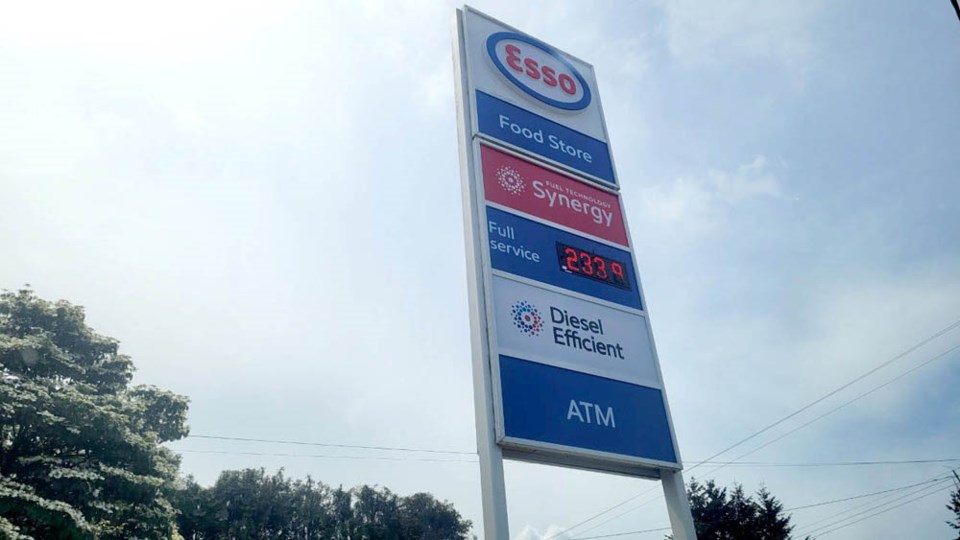It’s been busy at the Richmond Auto Mall — at least at certain counters.
With sky-high gas prices, more shoppers are lining up for EVs and fuel-efficient vehicles.
Charlee Daniel was one of them. She recently ditched her gas guzzler for a used Tesla from Richmond Auto Mall after waking up to see prices at the pump hit $2.17 per litre. This week, that number jumped to $2.33 in Richmond.
“I love my electric car — no doubt about it,” said Daniel.
Her used 2020 Tesla Model 3 cost her almost $63,000, but Daniel said she’s already recouped the extra cost by saving the $60/week she was spending on gas. Now she spends less than $6.50/week on electricity.
The high oil prices are largely being blamed on Russia’s invasion of Ukraine.
“Since gas prices are high, people are asking, ‘Why would I pay so much for a gas car when I can switch to electric and save money,” said Gurvir Grewal, a salesperson with Nissan, which, along with its own models of electric cars such as Leaf, has about 70 used Teslas in its inventory.
“Electric cars are so hot right now. Everyone wants one.”
EV chargers needed
But as the entrenched fossil-fuel car culture shifts to a more sustainable model — of hybrids and EVs — the need for more infrastructure to support this change is also growing.
The City of Richmond has been installing EV chargers in public places. Currently, there are 51 stations available for public use, and the city plans to increase that to 58 by next year.
They’ve also been adding chargers for city-owned vehicles as they expand their electric fleet.
But, along with installing chargers around the city, EV car advocate John Roston thinks the city should require existing strata buildings to install them, saying the lack of home charging options is the “biggest single obstacle” for using EVs.
“Richmond has done little to require charging in existing strata buildings,” he said.
Furthermore, he doesn’t think the chargers being installed around the city are “the right type.”
He pointed out most of the 52 public chargers are level-two chargers that are good for home use — only three are level-three chargers. (The higher the charging level, the faster the charging speed.)
“What we really need for public charging stations are level three,” he added.
Level-two chargers are the most common and can be installed at home or in public locations. They can top off most EVs from empty within 4.5 hours.
Level-three chargers can recharge most EVs to at least 80 per cent in about half an hour.
According to a report going to city council’s public works committee this week, the need for public charging stations is “growing at a faster pace than anticipated.”
In fact, usage at public chargers in Richmond went up by 34 per cent in the first three months of 2022. However, the city only plans to increase the number of public charging stations by seven. They will be located at Richmond City Hall, Richmond Animal Shelter and Capstan Park.
Meanwhile the city will increase the number of stations for city-owned vehicles by 57 for a total of 81 charging stations.
With EV charging demand growing, so is the need for money to support it.
A five-year, $1.5 million budget for Foreseeson Technology to maintain the city-owned EV chargers, approved two years ago, apparently isn’t enough to meet growing demand. City council will consider increasing this contract to $3.8 million.
Interest also grows in used cars
It’s not just the electric car market that is booming. Used cars are also in high demand, said Grewal with Nissan.
“There are no new cars being produced right now because of the automotive microchip shortage. So, the used car market suddenly got hot,” he explained.
The combination of supply chain issues, pent-up demand and low vehicle inventory mean the waiting list is growing longer.
Months ago, clients were told it would be a three- to four-month wait to get a new electric car. Now the wait is more like eight to 10 months, said Grewal.
Regardless of the wait, the demand for EVs is not waning, according to Stanley Leung with Open Road Toyota.
Leung said his company is releasing a new model EV in the coming months, and he already has more than 200 orders for it.
“People’s passion for electric cars isn’t going away; it’s only growing.”



